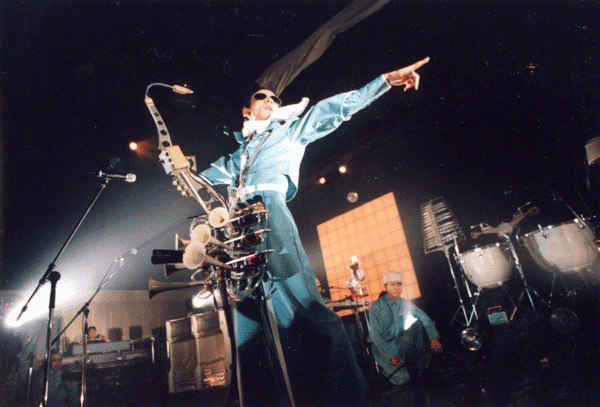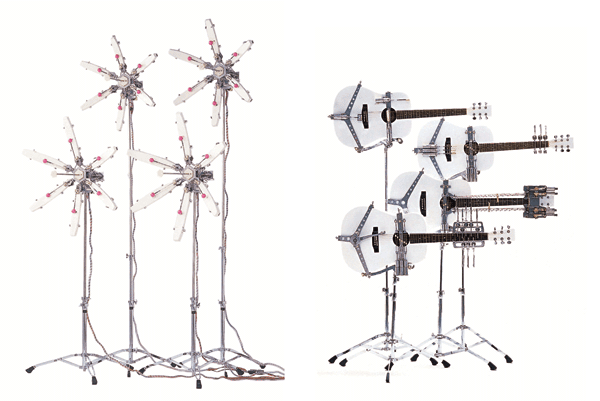FROM PRODUCT DESIGN TO PERFORMANCE by Helen Evans for Cluster issue No.02 Turin, Italy 2004
Maywa Denki's "Tsukuba Music"
At the Maison de la culture du Japon in Paris. 6,7,8 November 2003

"Maywa Denki has a reputation in Japan, like Sony, Panasonic, Microsoft " explains straight faced Nobumichi Tosa, President of Maywa Denki, during his product demonstration of Tsukuba, a series of beautifully absurd musical instruments. Amongst them, remote controlled maracas that are worn like angel wings, a singing robot, half bagpipe, half human that works like a pair of lungs and a set of automated Xylophones, in the form of flowers that open when they start to play and close when they have finished.
The world of Maywa Denki is a strange mixture of corporate irony, ingenious artistic invention and real technological innovation. Using the language of corporate culture, Maywa Denki describe their objects and prototypes as "products", a concert is a "product demonstration" and an exhibition is a "product presentation". Actively seeking to juxtapose simple business strategies with their eccentric art products, the result is a charming tongue in cheek game that has us all wanting to buy into their industrious story. Their company costume is blue work wear, inspired by the typical uniform of Japan's small electrical companies that supported the fast growth in the 1970s. The name Maywa Denki itself, comes from the title of Tosa's father's electrical company that went bust during the 1979 world oil crisis. Maywa Denki was reborn in 1993, by Tosa and his brother, this time as an artistic unit.
They perform with energy and fearless commitment and what is more, their unique instruments do actually sound good. The Tsukuba Music series was conceived to use the movement caused by motors or electro-magnetics using only 100 volts and their sound is actually created by the physical knocking or vibration of the instrument onto another substance. According the Tosa, the emergence of new technologies for music generation e.g. samplers, synthesisers and computers have separated music from the material, leaving music simply as information that can only be listened to with speakers. The Tsukuba Music was created to return our attention to music's origins, that music is created from materials. Electronics and programming are used for rhythmic precision, flexibility and easiness of use (they boast that everyone can play their instruments) but the sounds themselves remain analogue.
Tsukuba, also refers to the most advanced technological city in Japan. Might this be the birthplace of a new kind of analogue-automated sound?

Marimca An automated Xylophone in the form of a flower. The flowers open when they start to play and close when they have finished. (c) Yoshimoto Kogyo Co., Ltd/Maywa Denki, Photo: Jun Mitsuhashi
Mecha-Folk Fully-automated folk guitar. One guitar for plays drums, bass, guitar and mandolin. (c) Yoshimoto Kogyo Co., Ltd/Maywa Denki, Photo: Jun Mitsuhashi